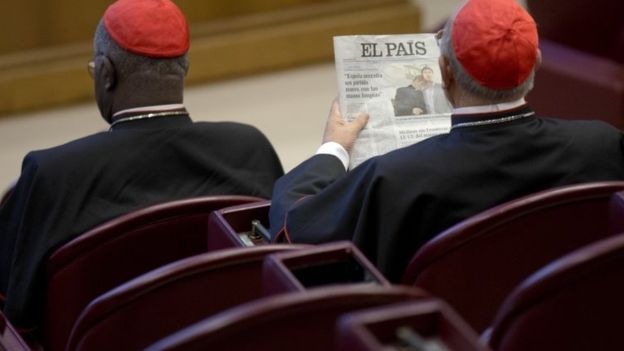Gay priest decries `inhuman` treatment of homosexual Catholics

He criticised what he called the Vatican`s hypocrisy in banning gay priests, even though he said the clergy was "full of homosexuals".
Pope Francis has yet to respond.
Until 3 October, Monsignor Charamsa held a senior post at the Vatican at the Congregation for the Doctrine of the Faith, the department that upholds Roman Catholic doctrine.
The Vatican immediately stripped him of his post after he held a news conference in a restaurant in Rome to announce that he was both gay and in a relationship. Roman Catholic priests are meant to be celibate.
At the time, the Holy See said the priest`s decision to come out on the eve of the Vatican`s synod on the family had been "irresponsible, since it aims to subject the synod assembly to undue media pressure".
`Rights denied`
The Polish priest has released to the BBC a copy of the letter he sent to the Pope, written the same day as the announcement, in which he criticises the Church for "persecuting" and causing "immeasurable suffering" to homosexual Catholics and their families.
He says that after a "long and tormented period of discernment and prayer", he had taken the decision to "publicly reject the violence of the Church towards homosexual, lesbian, bisexual, transsexual and intersexual people".
The 43-year-old says that while the Roman Catholic clergy is "full of homosexuals", it is also "frequently violently homophobic", and he calls on "all gay cardinals, gay bishops and gay priests [to] have the courage to abandon this insensitive, unfair and brutal Church".
He says he can no longer bear the "homophobic hate of the Church, the exclusion, the marginalisation and the stigmatisation of people like me", whose "human rights are denied" by the Church.
Church attitude unchanged
The priest goes on to thank Pope Francis - who is thought to have a more lenient attitude on homosexuality than some of his predecessors - for some of his words and gestures towards gay people.
The Pope recently met a gay former student of his during his recent visit to the US, and has previously said that gay people should not be marginalised in society.
But Krzysztof Charamsa says that the pontiff`s words will only be worthwhile when all the statements from the Holy See that are offensive and violent against homosexuals are withdrawn.
He also urged the Church to annul a decision taken by his predecessor, Pope Emeritus Benedict XVI, to sign a document in 2005 that forbid men with deep-rooted homosexual tendencies from becoming priests.
The Polish priest terms "diabolical" Pope Benedict`s statement that homosexuality was "a strong tendency ordered toward an intrinsic moral evil".
The priest writes that LGBT Catholics have a right to family life, "even if the Church does not want to bless it".
He later criticises the Vatican for putting pressure on states which have legalised equal or same-sex marriage.
He also expresses his fears about the impact his coming out may have on the treatment of his mother in Poland, "a woman of unshakable faith", saying she bears no responsibility for his actions.
The synod ended on Sunday, but made no change to its pastoral attitude to gay Catholics.
The final document agreed by the Synod Fathers reiterated Church teaching that gay Catholics should be welcomed with "respect" and "dignity". But it restated that there was "no basis for any comparison, however remote, between homosexual unions and God`s design for marriage and the family".
The synod voted through a paragraph saying that it was unacceptable for pressure to be put upon local churches over their attitude towards same-sex unions, or for international organisations to make financial help contingent on poor countries introducing laws to "allow or institutionalise" marriage between people of the same sex.















































